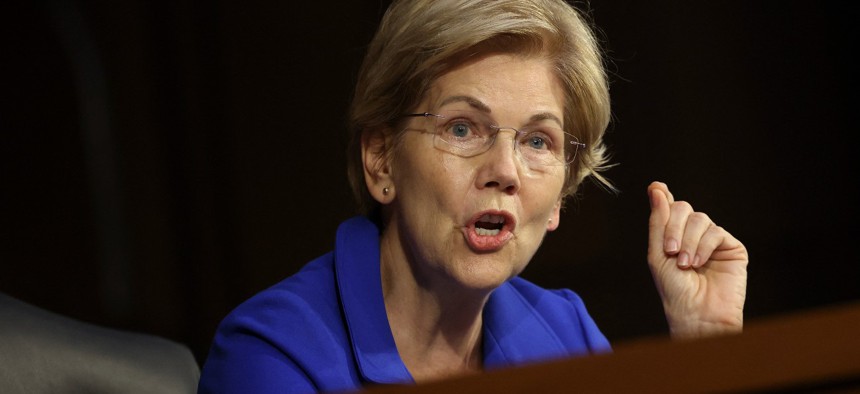
Sen. Elizabeth Warren, D-Mass., said House Republicans are putting debt ceiling negotiators in a tough spot. KEVIN DIETSCH/POOL/AFP via Getty Images
New Estimate: Lawmakers Have Until mid-August to Avoid 'Cataclysmic' Debt Ceiling Breach
In most likely scenario, federal employees are either furloughed or forced to work without pay.
The federal government is facing a deadline of Aug. 18 before it can no longer pay its debts, according to a new analysis, which found a default would have devastating impacts on the economy and government operations.
Congress is likely to suspend the debt ceiling until Sept. 30 to align the timing with the start of fiscal 2024 and the need to approve new government funding, under the Aug. 18 scenario, Moody's Analytics said in a report released Tuesday. That aligns with an estimate last month from the Bipartisan Policy Center, which predicted a default as soon as the summer or early fall. Treasury Department Secretary Janet Yellen previously told lawmakers that the government could default as soon as early June.
A debt default would have “cataclysmic” impacts on the U.S. economy, Mark Zandi, chief economist at Moody’s, told the Senate Banking, Housing and Urban Affairs Committee’s panel on Economic Policy. While economists and lawmakers have speculated about a range of outcomes if an unprecedented default were to occur, Zandi said in the most likely scenario, “Treasury would delay all payments until it received enough cash to pay a given day’s bills.”
That would require federal employees to either face furloughs or work with only the promise of back pay once the situation was resolved. In the other possibility, which Zandi called politically and potentially legally untenable, Treasury would prioritize some payments while allowing others to go unpaid. In either scenario, agency payments to beneficiaries, states, grantees, contractors and, potentially, their own employees, would be disrupted.
Left and right-leaning analysts and lawmakers at the hearing said a default must not occur and expressed some optimism that such an outcome would be avoided.
“If you're going to have a party, you got to pay the band,” said Sen. John Kennedy, R-La. “And it's time for us to pay the band, and we're going to do it. However, I think you will see some of us, including but not limited to the House Republicans, use this as an opportunity to talk about our rate of growth in spending and to talk about the rate of growth and our debt.”
The House Republican majority has demanded cuts to federal spending in exchange for a debt ceiling raise, suggesting fiscal 2024 discretionary spending at non-defense agencies be reduced by as much as 25%.
Sen. Elizabeth Warren, D-Mass., who chairs the subcommittee that held Tuesday’s hearing, said such a negotiating posture was forcing lawmakers “between a rock and a hard place.”
“House Republicans can either throw us into an immediate recession and cost us about a million jobs in the short term, if they do a debt default,” Warren said. “But if instead we cave in and go with the kinds of cuts they're talking about, we’ve got a severe recession.”
Zandi said reaching the cuts Republicans are seeking while excluding defense and veterans spending, as well as programs like Social Security and Medicare, would force Congress to “effectively eliminate all non-defense discretionary spending.” Federal programs related to housing, food inspection, transportation, health care and science would all face devastating impacts, he said. While President Biden has met with Republican leadership to discuss the debt ceiling, the White House has so far maintained the president will not negotiate over the debt limit.
Sen. Chris Van Hollen, D-Md., noted that everyone at the hearing expressed a similar view.
“I do appreciate the unity on this really important point, which is the United States cannot and must not default on its debt and violate the full faith and credit of the United States,” Van Hollen said.







